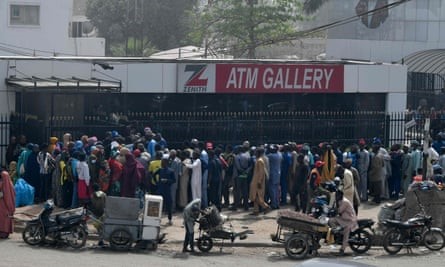
The cack-handed attempt by the Central Bank of Nigeria (CBN) to replace old 1,000, 500 and 200 naira banknotes for newly designed notes by Friday, 10th of February has gone down like a lead balloon. The Bank claims that the currency transition is intended to combat double digit inflation by reducing cash in circulation. The CBN asserts that its currency redesign and replacement policy would not only address inflation, which is currently running at 21%, but would also deter forgery while promoting a cashless society by limiting the number of withdrawals.
In a country where an estimated 40% of the adult population does not have a bank account – especially those living in rural areas- this was only ever going to result in chaos. Restrictions imposed by the CBN on dispensing of old notes (not allowed via ATM or over the counter) and new notes (only allowed via ATMs and not over the counter) compounded the problem and frustration of people who discovered that most ATMs were out of order.
Initial speculation that the cash shortage was caused by the banking authorities not releasing enough new notes has been replaced by a report from the country’s anti-fraud agency, the Economic and Financial Crimes Commission (EFCC). The EFCC confirmed raids in which officers had arrested bank managers for allegedly hoarding the new notes in cahoots with illicit currency traders rather than putting them in ATMs and giving them to customers.
Nigeria, one of the world’s largest oil producers, suffers from recurrent fuel shortages because of failure by the government to invest in its refineries. This means that the country has to import most of the fuel required to cover its populations needs. Recurring fuel shortages force citizens to wake up before the crack of dawn, queueing for hours in the blazing sun only to arrive at the top of the queue and be told that fuel has run out. Wasted days, inability to simply get from A to B, parents’ frustration at not being able to get their children to school on time has led to protests across the country as a prevailing sense of anarchy in the land dominates.
Despair is even making some voters question the point of the forthcoming elections and whether their votes will really make a difference. What is being referred to as the mystery of 3 queues is emblematic of government failure across many fronts. The convergence of multiple miseries against a backdrop of persistent hardship in the form of high unemployment, profound insecurity, sky-rocketing inflation and deprivations across many basic needs, a few short weeks before what has been called 2023’s most important elections in the world, threatens the elections. The cash chaos is a concern for this month’s presidential elections given that some election service providers require cash payment.
Nigerians, who are unaccustomed to queuing, now find themselves forced to form lines to access fuel, money or Permanent Voter Cards (PVCs). If you’re not queuing for fuel, you’re queuing to withdraw your hard-earned cash or to be able to exercise your civic right to vote! Ironically, it is not Buhari’s War Against Indiscipline (WAI) campaign of his previous tenure as military head of state, when soldiers forced Nigerians to queue that is changing their behaviour, it is a complete lack of collaboration locally by various government bodies. An emergency meeting convened by President Buhari is a last ditch effort to assuage tensions, with defiant optimism in some quarters that the elections will proceed unhindered.
